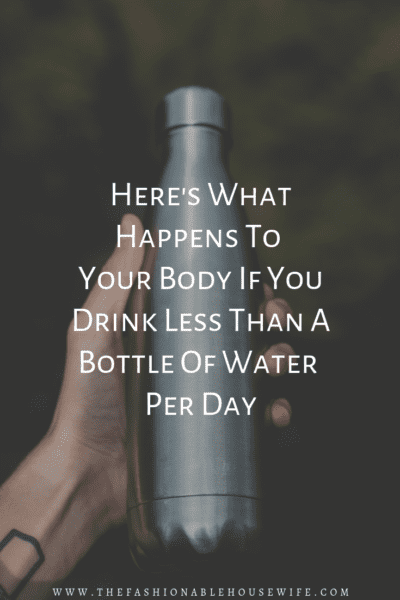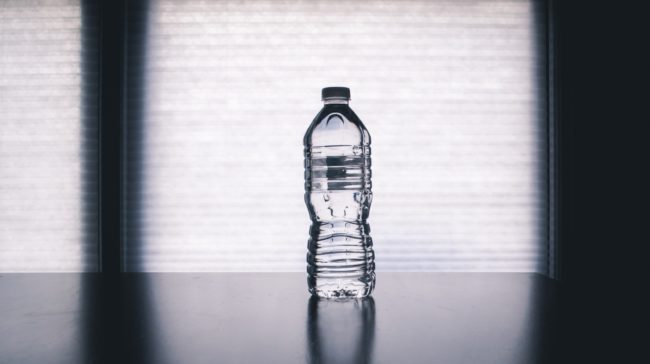
Almost any health-related article contains the magic phrase ‘drink plenty of water’. But what exactly happens if you don’t?
Up to 60% of the human adult body is made up of water. In fact, H.H. Mitchell stated in the Journal of Biological Chemistry that the brain and the heart are comprised of 73% water, while the lungs are around 83% water.
Our bodies use water in all cells, organs, and tissues to regulate and maintain normal function and temperature. It is essential for keeping our kidneys, skin and other organs in top working condition.
You lose more water throughout the day than you realize- your body loses water through sweating, digestion, excretion and even breathing. This means it is crucial to rehydrate by drinking water, as well as by eating foods with high water content.
Downing a specific amount of water is not that high on anyone’s priority list, and unless you are watching a water-intensive film like Aquaman or Moana (watching all that water in high definition had me really thirsty), it’s easy to forget to chug enough water when preoccupied with work and chores.
Some lesser known benefits of staying sufficiently hydrated are:
• It promotes weight loss by helping to get rid of the by-products of fats while keeping you satiated.
• It helps form saliva and mucus, which keeps our nose, mouth, eyes, and throat moist while protecting them from damage and friction due to dryness.
• It is the key to glowing, healthy, nourished skin, by making it less prone to turning dry and wrinkling.
• It regulates body temperature, especially for those who live in hot climates or are highly physically active.
• Cartilage in the joints contains water that is necessary for keeping them lubricated and healthy to provide sufficient cushioning and avoid joint pain.
• Staying hydrated keeps your energy up and your brain working at its optimal level.
• It keeps your body’s waste disposal system functioning efficiently.
• It boosts your immune system.
So how much water does one really need?
There is no hard and fast rule to follow when it comes to how much water one must drink.
Water intake is dependent on a lot of internal as well as external factors such as age, weight, gender, activity levels, and temperature of the surrounding area.
A general recommendation is to drink six to eight glasses of water a day, which comes to about 1.5 to 2 liters of water a day. Since most disposable bottles are can hold about half a liter, this means that one must down three to four bottles of water daily.

What happens when you don’t drink enough water?
Your body sends delayed thirst signals to your mind, which unfortunately means that, by the time you become aware of your thirst, your body is already dehydrated.
• Even mild dehydration (fluid loss of as little as 1-3%) negatively affects energy levels, attention span, motor coordination, and mood, and can lead to significant reductions in memory and brain performance.
• Your appearance will get affected if you remain dehydrated for an extended period. Skin dulls down and loses its glow, and lips become dry and begin to peel. Your mouth and throat may also feel dry, which can actually cause an increase in caries due to the absence of the natural cavity-fighting effects of saliva. The lack of water can also lead to the undesirable occurrence of bad breath or halitosis caused by a build-up of bacteria in your mouth.
• When you perform physical activity on a dehydrated body, it can cause you to feel dizzy, faint or exhausted. You will begin to feel constantly tired, even after getting enough sleep.
• This can also lower the volume of blood in your body. The thicker your blood becomes, the harder your cardiovascular system has to work. Your heart rate and breathing may both increase due to this.
• Insufficient water also impairs the body’s ability to properly regulate temperature, which increases your body temperature, also known as hyperthermia.
• Your digestive and excretory systems will be out of whack. This means you will experience the highly uncomfortable side effect called constipation. Furthermore, you won’t pee very often, and when you do, your urine will be darker than usual, as opposed to the standard pale yellow it should be, which is not a good sign.
• Another somewhat unexpected consequence of insufficient hydration is that you gain water weight. Your body begins to retain as much water as it can, which may make your face and extremities puffy and swollen. This gets resolved when you start to drink a sufficient amount of water again.
• You may also experience frequent, unexplained headaches. Without the requisite amount of water, your cells will shrink. This can cause your brain actually to shrink from fluid loss, which causes a headache. These headaches can range from mild and dull to severely debilitating but quickly disappear after gulping down some H2O.
• No one likes it when you’re cranky, which is precisely what you’ll be if you don’t hydrate properly. Not only will people begin to avoid you because of the sudden change in your temperament, but dehydration will also adversely affect your own ability to perform daily tasks and chores.
• Overeating is a common consequence of being dehydrated. This happens when your mind misinterprets the thirst signals as hunger pangs, causing you to eat more than you usually would. Furthermore, without water to fill your tummy and keep you satiated, you have more space for that extra serving of food.

How can you monitor your hydration levels?
Once you have identified if you are dehydrated or not, maintaining proper levels of hydration is easy! Following these steps will help you stay hydrated:
1. Pay attention to how much you drink: track your water intake for a week by maintaining a daily log. This will help you identify and rectify any shortages in your water intake.
2. Keep an eye on your peeing habits: It is normal to urinate around 3 to 4 times a day. Any less than that means you have to up your water intake, ASAP. Your pee should also be a pale yellow or clear color.
3. Carry a water bottle with you wherever you go.
4. Be aware of how and when you feel thirsty, and be sure to rehydrate as soon as you do to help clean your liver.
Now that you are aware of the consequences of insufficient hydration book an online consultation with the medical experts at Click Pharmacy to ascertain whether you are drinking enough water for your needs.



